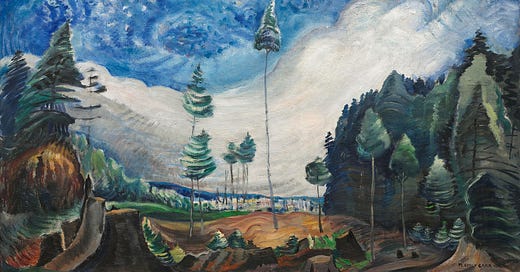Another 40mg Hands lie loose On the cold December cement Face turns blue Dying — live and technicolour * 40mg! Death rattle — like in books Hold her legs! Body crumpled — as litter, discarded Pump her chest! Ribs popping — my breath, held Another 40mg! Sirens wail — prayed for arrival Intubate. Oxygen hiss — surely, surely * But as she came to, startled, with a crowd of men looking down at her, she lurched up in confusion to strike out. From the corner of her eye she saw the now discarded tube they had shoved in her throat to open up her airways; and in car-crash recognition pointed at it. A terrible look came over her young face. She began to weep, wordlessly and impotently pointing at the tube. The moment ended. My scene in her story ended, and I went to work. Hopefully that was her rock bottom. God I pray that was her rock bottom.
Blank verse? Free verse? New territory for me regardless.
This poem recounts my first experience with an overdose, nearly 8 years ago outside my work in the Downtown Eastside of Vancouver. Since this young woman, there’s been quite a few other I’ve been involved with; two very recently as things seem to be picking up again round these parts.
A tragic thing, all that pain in need of masking. Indeed the mask itself, a tragedy.
Coleridge’s poem, The Pains of Sleep is one of the most beautiful and all the more tragic and therefore best artistic representations of the internal feelings surrounding addiction. I do not know the feelings so strongly or intimately myself, only peripherally. But from my discussions and relationships with those that are in the midst of the intensity, or having recently emerged, Pains is accurate. Coleridge suffered from addiction to opium, for a variety of different reasons. In this poem he recalls the dark places his mind goes as he thrashes through Laudanum Dreams.
There are some heartbreaking lines of verse here that I’ve pulled out, but I implore you to read the whole thing. I found it very interesting to hear his perspective on this condition, and the use of language he employs. Much of how addiction seems to be communicated in modern times is from gritty, “real” voices, less so measured or poetic attempts.1 Often it feels that ‘tone’ has to match ‘content’; but this feels to me more of a preference or even cultural leaning for how we talk about various subjects. Lighthearted verse in airy limerick prose, or simple layout. Poetry about a confusing subject must look confused on the page with overused enjambment. Coleridge seems to have succeeded, in my mind, at laying open this ravenously fraught topic by simply writing a poem about how he feels, and does so in the style/voice that he uses in other work like Frost at Midnight or Life.
All to say this poem inspires both through content, form, and voice.
This is part of the second stanza:
The first lines I highlight are the queer mixed feelings of a longing ache and derisive disgust — perhaps on random people or objects — perhaps on oneself. This feeling is certainly not unfamiliar, I’m sure, to people not struggling with addiction only to substances, but to anxiety and control.
The lines noted at the bottom of the excerpt summarize the all-encompassing negativity that comes with felt powerlessness to overcome one’s addiction. It all leads to such sad conclusions; the stifling of personhood. That’s certainly what I’ve seen brokenness be, really. A crushing weight that drowns possibility of change. The weight of systems, the burden of past failures, the shackles of self-doubt, a yoke of generational inheritance. Whatever the specifics; a smothered potential.
We and Coleridge are not unaware of the lost lives we could have had or be living. Nor are most of those in the utmost depths of addiction,; and so the pain is all the worse. Coleridge certainly knows and understands, indeed he is contemptuous of these deeds and thoughts but is not strong enough — this time. For though he knows and loathes, he does yet wish and do!
He longs for the cup to be taken from him. For the desires to be no longer so. For the choices not to matter as much as they do.
How shall he overcome? If he can find and feel love. To be loved will give him what he needs. If he is loved he then will be able to love back — in beautiful sovereign control he can and will return that love.
I pray this poem of Coleridge’s would inspire, would push some readers to Love those around them who are struggling with addiction of any sort.
Such a broad call to action, but I’m sure you can figure something out.
Also, leave a comment and let me know your thoughts. Thanks!
I’m sure there are many offerings I don’t know, but Soundgarden’s Rusty Cage and Nine Inch Nails’ Hurt are very evocative descriptions. The originals and Johnny Cash versions are all great.








I think the more these things get talked about, the more exposure. The more exposure, the more help people may get because it's no longer some distant problem; it's something more people have at least some familiarity with. Very nice work, and I agree, it's a continuing tragedy.
Giving the experience words - whether the addict, or the helper - is a great way to approach the topic with empathy and sincerity. Well done, sir.